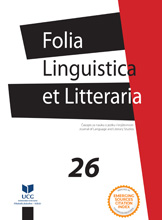(RE)CLAIMING ENGLISH LANGUAGE TODAY
(RE)CLAIMING ENGLISH LANGUAGE TODAY
Author(s): Nadežda M. StojkovićSubject(s): Language acquisition, Globalization, Ontology
Published by: Filološki fakultet, Nikšić
Keywords: English language; globalization; neocolonialism; native speakers; ontology;
Summary/Abstract: In the huge and most diverse discussion on the influence of the English language as a second, international, or bridge language, there are distinctive voices drawing attention to the fact that this language as nowadays so widely used in innumerable contexts, is no longer ‘owned’ by the community of speakers to whom it is mother language, those primarily of the countries from where English language originates. Moreover, the number of people speaking, or rather using English language today either as their second or foreign language, by far outnumbers people to whom it is native. Situation being such, it is further claimed the concept of ‘standard English’ reflects inherent inequality stance, for if it belongs to everyone speaking it, then insisting on the supremacy on only one of its variants means placing all those speakers of it in a subdued position, and this possibly being yet another facet of English an agent of neocolonialism and globalization (Pennycook 1998, Phillipson 1992). The spread of the English language has been much investigated as oppressive to the formation and expression of personal and collective identities, degrading national languages and through globalization diminishing the impact of local cultures (Bhaba 1990), that it challenges cultures and discourses, being the impetus for continuous re-codification and re-colonisation (Foucault 1980).
Journal: Folia Linguistica et Litteraria
- Issue Year: 2019
- Issue No: 26
- Page Range: 185-193
- Page Count: 9
- Language: English

